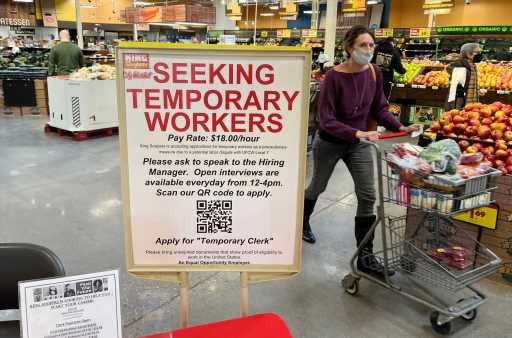King Soopers, union brace for strike in Denver area, Parker, Boulder
As King Soopers union members prepared to strike across the metro area, the company offered on Tuesday what it called its final offer, boosting its proposal on wages and bonuses by $22 million.
The $170 million package includes wage increases of up to $4.50 an hour in the first year, based on job classification and tenure, additional raises over the life of the contract and bonuses ranging from $2,000 to $4,000 for ratification of the contract.
The United Food and Commercial Workers Local 7 rejected the company’s latest proposal Tuesday — what King Soopers called its “last, best” offer — after also spurning a $148 million offer last week, the last time the two sides met at the bargaining table.
The union has called for a three-week strike starting at 5 a.m. Wednesday in the Denver area, Boulder and Parker, the sites of stores where the contracts with King Soopers have expired.
The strike, being waged on claims of unfair labor practices, will involve about 8,400 workers and 68 stores.
“We strike because it has become clear this is the only way to get what is fair, just and equitable for the grocery workers who have risked their lives every day just by showing up to work during the pandemic,” Cordova said in a statement.
Cordova said the company still hasn’t given the union information on wages, bonuses, pensions and other items that it needs to evaluate the latest proposal.
The labor dispute began heating up in late December, with the UFCW Local 7 filing a lawsuit in federal court that accuses Colorado’s largest grocery chain of unfair labor practices. King Soopers responded Monday with a complaint to the National Labor Relations Board accusing the union of the same thing.
The union on Monday rejected a suggestion by King Soopers to call in a federal mediator, saying involving a third party would bog down the process.
The feedback King Soopers is getting is that a majority of the employees want to vote on the company’s proposal, said Joe Kelley, president of King Soopers and City Market.
“Unfortunately they’re not being given that opportunity. But we continue to reach out to Kim and her team to see if we can get this vote scheduled,” Kelley said. “Once again, she’s not replying to us.”
The strike will affect the King Soopers stores in the following cities: Denver, Arvada, Aurora, Boulder, Broomfield, Centennial, Commerce City, Edgewater, Englewood, Evergreen, Federal Heights, Glendale, Golden, Greenwood Village, Highlands Ranch, Lakewood, Littleton, Louisville, Thornton, Westminster and Wheat Ridge.
The union’s contracts with other King Soopers and City Market stores, both owned by Kroger, expire later in January and in February. The union is still negotiating with Albertsons, which owns Albertsons and Safeway stores in the state.
King Soopers and the union have been gearing up for employees walking off the job. Employees in the Denver area, Boulder, Parker and Colorado Springs voted last week to authorize the strike. Employees in Colorado Springs are staying on the job for now because the meat workers’ contract hasn’t run out yet.
The UFCW Local 7 said it expects union members from across the country to come to Colorado to support the striking workers.
Meanwhile, King Soopers has been advertising for replacement workers at $18 an hour. The union has said the pay is higher than what many regular employees make.
The company said the average of pay in Colorado is $18.29.
“This is what happens at this point when they can’t find common ground to reach an agreement. Both sides start getting more polarized,” said Cindi Fukami, a professor of management in the Daniels College of Business at the University of Denver.
While there have been last-minute efforts, such as calling for federal mediation, Fukami said it’s “almost like fiddling while Rome burns.”
“Partly it’s trying to get public opinion on one side or the other, but it doesn’t help to resolve the issues that are causing this,” Fukami said.
Cordova said the union is willing to return to the bargaining table but it needs more data from King Soopers.
“The only offer on the table is ours. The bargaining committee rejected the company’s offer last week,” Cordova said. “They’ve been telling members and the community and the media they want workers to vote on an offer that’s already been rejected.”
The union says King Soopers’ proposals are full of concessions they want from employees at a time when they are still working during a pandemic. One of the proposals criticized by the union would cap sick leave at 48 hours a year.
Wages, staffing, the outsourcing of jobs and health and safety concerns are also priorities, Cordova said. A majority of King Soopers employees are part-time and the union wants to find a faster pathway to full-time jobs for those who want more hours, she added.
A study commissioned by four branches of the UFCW and released Tuesday said that 78% of the employees surveyed at Kroger-owned stores in Colorado and two other states reported not having enough food. That is more than seven times the national rate, said Peter Dreier, a co-author of the study.
“That’s particularly ironic and tragic because these are people who spend their whole day around food,” said Dreier, a professor of urban policy at Occidental College in Los Angeles.
The survey also found that 44% of the employees couldn’t pay rent and 14% of the part-time employees and 9% of the full-time employees were homeless or had been in the past year.
The study, co-authored by Daniel Flaming, president of the nonprofit research firm Economic Roundtable, was based on responses from Kroger employees in the Puget Sound region of Washington, Colorado and Southern California. About 28%, or 10,287, of the 36,795 workers contacted responded.
Kroger is doing well, Dreier added. The study said the company’s operating profits were $4.05 billion in 2020 and the company bought back $1.3 billion in stocks during that period.
At the end of 2021, Kroger authorized a $1 billion buyback of stock.
“That was money they could have spent on making workers’ incomes more sustainable,” Dreier said.
Kroger said in a statement that it invests hundreds of millions of dollars annually in its employees’ wages, health care, retirement savings and career opportunities.
“We are one of the largest employers in America, employing nearly half a million people, and our longstanding culture of opportunity has created an environment where many people, whether it be a cashier, clerk, stocker, or pharmacy technician, come for a job and stay for a career,” the company said.
DU professor Fukami said the grocery business operates on “tiny margins.” She said competition from Walmart has been an issue for King Soopers for years.
“If you’re Walmart, you have non-union workers and you’re paying them very low wages, so you can undercut the prices more than the unionized grocery stores. Safeway’s in the same boat,” Fukami said.
Because of widespread labor shortages, King Soopers employees have other options, said Fukami, adding that she wonders where the company will find enough replacement workers.
“That does suggest that the workers will have some power over the company just on the basic supply and demand of workers,” she added.
Source: Read Full Article


